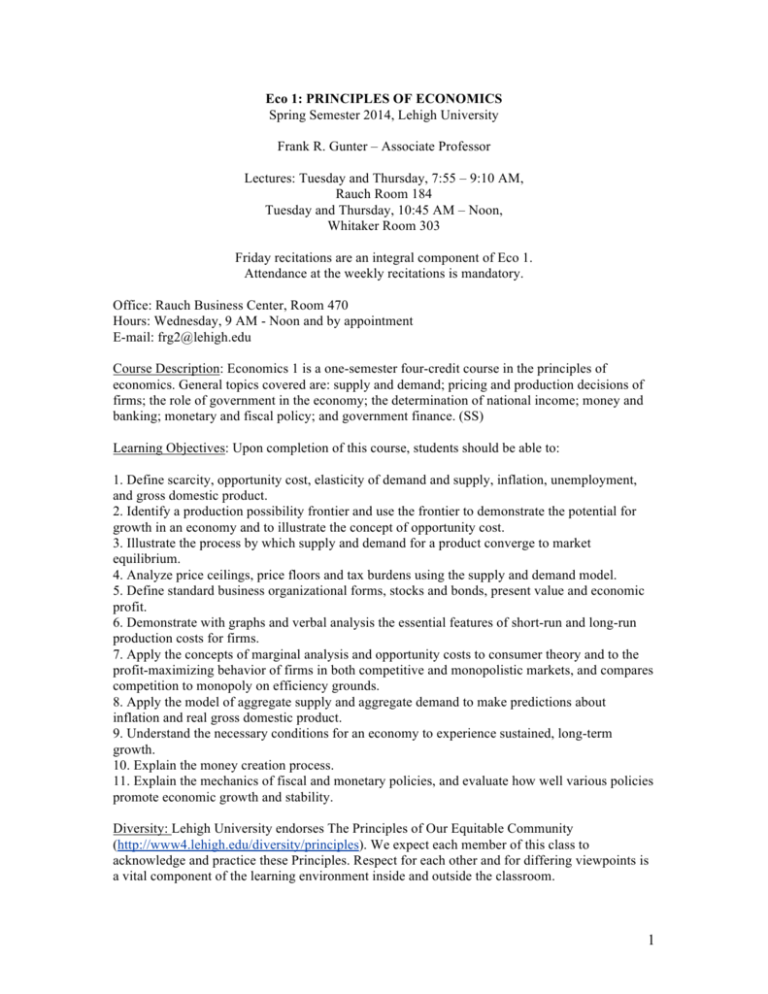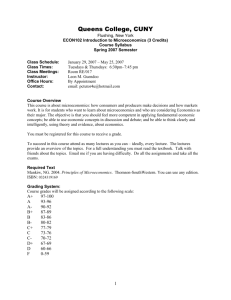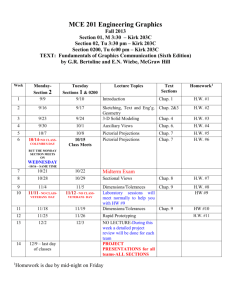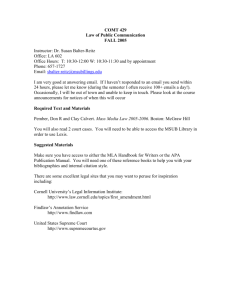
Eco 1: PRINCIPLES OF ECONOMICS
Spring Semester 2014, Lehigh University
Frank R. Gunter – Associate Professor
Lectures: Tuesday and Thursday, 7:55 – 9:10 AM,
Rauch Room 184
Tuesday and Thursday, 10:45 AM – Noon,
Whitaker Room 303
Friday recitations are an integral component of Eco 1.
Attendance at the weekly recitations is mandatory.
Office: Rauch Business Center, Room 470
Hours: Wednesday, 9 AM - Noon and by appointment
E-mail: frg2@lehigh.edu
Course Description: Economics 1 is a one-semester four-credit course in the principles of
economics. General topics covered are: supply and demand; pricing and production decisions of
firms; the role of government in the economy; the determination of national income; money and
banking; monetary and fiscal policy; and government finance. (SS)
Learning Objectives: Upon completion of this course, students should be able to:
1. Define scarcity, opportunity cost, elasticity of demand and supply, inflation, unemployment,
and gross domestic product.
2. Identify a production possibility frontier and use the frontier to demonstrate the potential for
growth in an economy and to illustrate the concept of opportunity cost.
3. Illustrate the process by which supply and demand for a product converge to market
equilibrium.
4. Analyze price ceilings, price floors and tax burdens using the supply and demand model.
5. Define standard business organizational forms, stocks and bonds, present value and economic
profit.
6. Demonstrate with graphs and verbal analysis the essential features of short-run and long-run
production costs for firms.
7. Apply the concepts of marginal analysis and opportunity costs to consumer theory and to the
profit-maximizing behavior of firms in both competitive and monopolistic markets, and compares
competition to monopoly on efficiency grounds.
8. Apply the model of aggregate supply and aggregate demand to make predictions about
inflation and real gross domestic product.
9. Understand the necessary conditions for an economy to experience sustained, long-term
growth.
10. Explain the money creation process.
11. Explain the mechanics of fiscal and monetary policies, and evaluate how well various policies
promote economic growth and stability.
Diversity: Lehigh University endorses The Principles of Our Equitable Community
(http://www4.lehigh.edu/diversity/principles). We expect each member of this class to
acknowledge and practice these Principles. Respect for each other and for differing viewpoints is
a vital component of the learning environment inside and outside the classroom.
1
Academic Integrity: Lehigh University expects that all students will act in a manner that reflects
personal and intellectual honesty.
Proscribed conduct includes cheating and plagiarism.
Cheating includes but is not limited to:
1.
The use of any unauthorized assistance in taking quizzes, tests, or examinations.
The possession at any quiz or examination of any articles that are prohibited will be
regarded as evidence of responsibility.
2.
The dependence upon the aid of sources beyond those authorized by the instructor in
writing papers, preparing reports or homework, solving problems, or carrying out other
assignments.
3.
The acquisition, without permission, of tests or other academic material belonging to a
member of the university faculty or staff.
4.
Any attempt to falsify an assigned grade in an examination, quiz, report, program, grade
book, or any other record or document.
5.
The creation and/or submission of falsified data in any experiment, research paper,
laboratory assignment, or other assignment.
6.
Collusion occurs when students willfully give or receive unauthorized or
unacknowledged assistance. Both parties to the collusion are considered responsible.
Plagiarism includes but is not limited to the direct use or paraphrase, of the work, themes or ideas,
of another person without full and clear acknowledgement.
Texts:
Hubbard, R.G. and A.P. O'Brien (2013) Economics, Fourth, Upper Saddle River, New Jersey:
Pearson Prentice Hall. (Required)
Access to MyEconLab. Registration information will be provided during second class of
semester. (Required)
Lecture and Quiz Schedule:
Part 1: Introduction
January 14th
January 16th
January 21st
January 23rd
Economics: Foundations and Models
Trade-offs and the Market System
Interaction of Demand and Supply
Economic Efficiency, Price Setting and Taxes
Part 2: Markets in Action
January 28th
Externalities
January 30th
Elasticity
February 4th
Health Care
Chap. 1 & Appendix
Chap. 2
Chap. 3
Chap. 4
Chap. 5
Chap. 6
Chap. 7
2
Part 3: Domestic and International Economies
February 6th
Firms and the Stock Market
February 11th
Personal Finance
February 13th 4 PM (Thursday)
Chap. 8 & Appendix
First Quiz (Parts 1-2)
Part 3: Domestic and International Economies (continued)
February 18th
Comparative Advantage
Chap. 9
Part 4: Microeconomic Foundations
February 20th
Consumer Choice
February 25th
Technology, Production and Costs
Chap. 10
Chap. 11
Part 5: Market Structure and Firm Strategy
February 27th
Perfectly Competitive Markets
Chap. 12
March 3rd – March 7th Spring Break
Part 5: Market Structure and Firm Strategy (continued)
March 11th
Monopoly & Monopolistic Competition
March 13th
Oligopoly and Pricing Strategy
March 18th
Entrepreneurship
Part 6: Markets for Factors of Production and Public Choice
March 20th
Markets for Factors and Public Choice
Part 7: Macroeconomic Foundations and Long-Run Growth
March 25th
GDP, Unemployment, Inflation
March 27th 4 PM (Thursday)
Chap. 13 & 15
Chap. 14 & 16
Paper on CourseSite
Chap. 17 & 18
Chap. 19
Second Quiz (Parts 3-6)
Part 7: Macroeconomic Foundations and Long-Run Growth (continued)
April 1st
April 3rd
April 8th
GDP, Unemployment, Inflation (continued)
Long-Run Economic Growth and Business Cycles
Policies for Long-Run Economic Growth
Chap. 20
Chap. 21
Chap. 22
Part 8: Short-Run Fluctuations
April 10th
Aggregate Expenditures
th
April 15
Aggregate Demand and Supply
Chap. 23
Chap. 24
Part 9: Monetary and Fiscal Policy
April 17th
Fiscal Policy
April 22nd
Money, Banks and the Federal Reserve
April 22nd
Monetary Policy
Chap. 27
Chap. 25
Chap. 26 & 28
Part 10: The International Economy (This is an important topic but, because of time
constraints, it will not be covered.)
April 26th (Saturday) Review/Consultation/Study for Eco 1
3
TBD Final Exam Cumulative (Parts 1-9)
Homework: Carefully completing assigned homework leads to both better understanding and
grades. Homework will be assigned on MyEconLab almost every Friday starting on the second
Friday of the Semester. Completed homework must be submitted no later than noon on the
following Wednesday. A late homework will receive half-credit. It doesn’t make any difference
why the homework is late – your fault, my fault, the TA’s fault, the computer’s fault, the dog’s
fault, a “meteor crashed through my dorm roof and broke my leg and by the time I returned from
the emergency room, it was Wednesday afternoon” fault – any homework received later than
noon on Wednesday will receive half credit.
Grading System:
First Quiz (Thursday, February 13th) 20%
Second Quiz (Thursday, March 27th) 25%
Homework 5%
Recitation participation and attendance, and curve busters 10%
Final Exam 40%
The Eco 1 Final Exam is cumulative. Half of the questions will be on the material from Parts 1 - 6
while the other half will be on the material in the last third of the course (Parts 7 – 9).
You are required to take the quizzes, submit homework, and participate in the recitations –
participating in the recitations are not optional. If you are unable to take a quiz then contact
your TA or me as soon as possible. If an excused absence is obtained for a quiz then your final
exam will count as both the final and the excused quiz. For example, if you received an excused
absence for the first quiz (February 13th) then your final exam will count for 60% of your course
grade. If one or both of your 4 O’clock quizzes conflicts with that of another class then please
notify me by email as soon as possible.
Curve busters are unannounced quizzes that are administered during the lecture hour. At least six
curve busters will be given and the lowest two curve busters’ scores will not be included in your
grade.
Eco Lottery will be scheduled this semester. Details will be discussed in class.
Important! Do not make your end-of-the-semester airline or other travel reservations until
the final exam schedule is published. “I have a non-refundable ticket!” is not a valid excuse
to miss or reschedule the final exam. Please note that the last day for final exams this
th
semester is May 7 !
4







